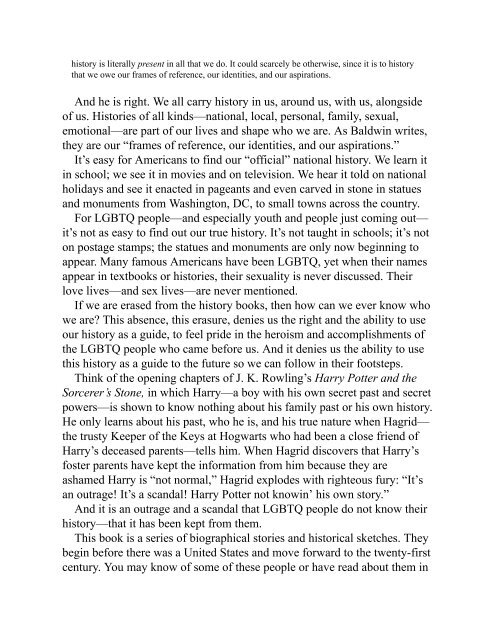Create successful ePaper yourself
Turn your PDF publications into a flip-book with our unique Google optimized e-Paper software.
history is literally present in all that we do. It could scarcely be o<strong>the</strong>rwise, since it is to history<br />
that we owe our frames <strong>of</strong> reference, our identities, and our aspirations.<br />
And he is right. We all carry history in us, around us, with us, alongside<br />
<strong>of</strong> us. Histories <strong>of</strong> all kinds—national, local, personal, family, sexual,<br />
emotional—are part <strong>of</strong> our lives and shape who we are. As Baldwin writes,<br />
<strong>the</strong>y are our “frames <strong>of</strong> reference, our identities, and our aspirations.”<br />
It’s easy <strong>for</strong> Americans to find our “<strong>of</strong>ficial” national history. We learn it<br />
in school; we see it in movies and on television. We hear it told on national<br />
holidays and see it enacted in pageants and even carved in stone in statues<br />
and monuments from Washington, DC, to small towns across <strong>the</strong> country.<br />
For LGBTQ people—and especially youth and people just coming out—<br />
it’s not as easy to find out our true history. It’s not taught in schools; it’s not<br />
on postage stamps; <strong>the</strong> statues and monuments are only now beginning to<br />
appear. Many famous Americans have been LGBTQ, yet when <strong>the</strong>ir names<br />
appear in textbooks or histories, <strong>the</strong>ir sexuality is never discussed. Their<br />
love lives—and sex lives—are never mentioned.<br />
If we are erased from <strong>the</strong> history books, <strong>the</strong>n how can we ever know who<br />
we are? This absence, this erasure, denies us <strong>the</strong> right and <strong>the</strong> ability to use<br />
our history as a guide, to feel pride in <strong>the</strong> heroism and accomplishments <strong>of</strong><br />
<strong>the</strong> LGBTQ people who came be<strong>for</strong>e us. And it denies us <strong>the</strong> ability to use<br />
this history as a guide to <strong>the</strong> future so we can follow in <strong>the</strong>ir footsteps.<br />
Think <strong>of</strong> <strong>the</strong> opening chapters <strong>of</strong> J. K. Rowling’s Harry Potter and <strong>the</strong><br />
Sorcerer’s Stone, in which Harry—a boy with his own secret past and secret<br />
powers—is shown to know nothing about his family past or his own history.<br />
He only learns about his past, who he is, and his true nature when Hagrid—<br />
<strong>the</strong> trusty Keeper <strong>of</strong> <strong>the</strong> Keys at Hogwarts who had been a close friend <strong>of</strong><br />
Harry’s deceased parents—tells him. When Hagrid discovers that Harry’s<br />
foster parents have kept <strong>the</strong> in<strong>for</strong>mation from him because <strong>the</strong>y are<br />
ashamed Harry is “not normal,” Hagrid explodes with righteous fury: “It’s<br />
an outrage! It’s a scandal! Harry Potter not knowin’ his own story.”<br />
And it is an outrage and a scandal that LGBTQ people do not know <strong>the</strong>ir<br />
history—that it has been kept from <strong>the</strong>m.<br />
This book is a series <strong>of</strong> biographical stories and historical sketches. They<br />
begin be<strong>for</strong>e <strong>the</strong>re was a <strong>United</strong> <strong>States</strong> and move <strong>for</strong>ward to <strong>the</strong> twenty-first<br />
century. You may know <strong>of</strong> some <strong>of</strong> <strong>the</strong>se people or have read about <strong>the</strong>m in


















